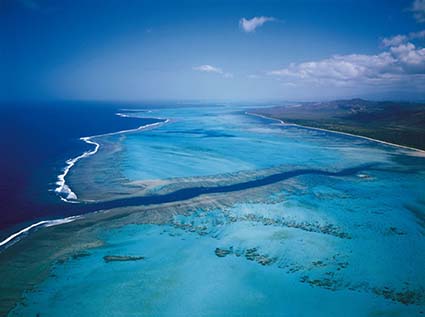
NOUMEA (Secretariat of the Pacific Community/Pacific Media Watch): Pacific Island leaders are looking to French President François Hollande to take their compelling case for action on climate change all the way to the United Nations conference in Paris in 12 months’ time.
France will host the 21st session of the Conference of the Parties to the UN Framework Convention on Climate Change in Paris in late 2015, where a new, universal climate agreement is due to be reached.
With climate change seen as an emerging crisis for the Pacific, the Secretariat of the Pacific Community (SPC) is bringing Pacific leaders face-to-face with President Hollande for a High-Level Dialogue on Climate Change at the organisation’s headquarters in Noumea.
“Despite our collective efforts, the voice of the Pacific Islands is too often drowned out at international climate talks so there’s a bridging role many in the Pacific hope that France can play in taking forward the case of the Pacific on the global stage,” SPC Director-General Dr Colin Tukuitonga said.
Among those attending the high-level dialogue are Cook Islands Prime Minister Henry Puna, Kiribati President President Anote Tong, Niue Premier Toke T. Talagi, New Caledonian Territorial President Cynthia Ligeard, President of French Polynesia Edouard Fritch, Tuvalu Prime Minister Enele Sopoaga, and Vanuatu Prime Minister Joe Natuman as well as ministers from across the Pacific region.
French Minister for Foreign Affairs and International Development Laurent Fabius and the French President's Special Envoy for the Protection of the Planet, Nicolas Hulot, will also take part in the high-level event as well as a roundtable and bilateral meetings with Pacific leaders tomorrow.
The Fifth Assessment Report of the Intergovernmental Panel on Climate Change (IPCC) and SPC scientific data suggest that projected changes to the climate in the Pacific over the coming decades are likely to have profound impacts on the development aspirations of all 22 Pacific Island countries and territories, which include current and former French territories.
Tsunami damage
For example, a 2009 tsunami caused damage in Samoa estimated at US$147 million, equivalent to more than one quarter of the country’s gross domestic product, and this toll was repeated following Cyclone Evan in 2012.
SPC hopes the high-level dialogue will broaden understanding of the critical nature of issues in the Pacific region linked to climate change and spur further action.
“The impacts on food and water security, health and tourism linked to climate change present a range of difficult challenges that could undermine the economies and livelihoods of Pacific Island communities, particularly considering our high dependence on fisheries and agriculture,” Dr Tukuitonga said.
“Any reduction in ocean productivity and the health of coral reefs due to ocean acidification as a result of climate variability will have life-changing implications for Pacific Islanders. Many of the region’s major commodity export crops, such as coffee, copra and sugar, are also likely to be seriously affected,” he said.
The other organisations to accept the SPC invitation to contribute to the dialogue are the Pacific Islands Forum Secretariat (PIFS), Secretariat of the Pacific Regional Environment Programme (SPREP), University of the South Pacific (USP), European Union, GIZ, United Nations Development Programme (UNDP), Forum Fisheries Agency (FFA) and the United Nations Children’s Fund (UNICEF).
More information
This work is licensed under a Creative Commons Attribution-NonCommercial 3.0 New Zealand Licence.




